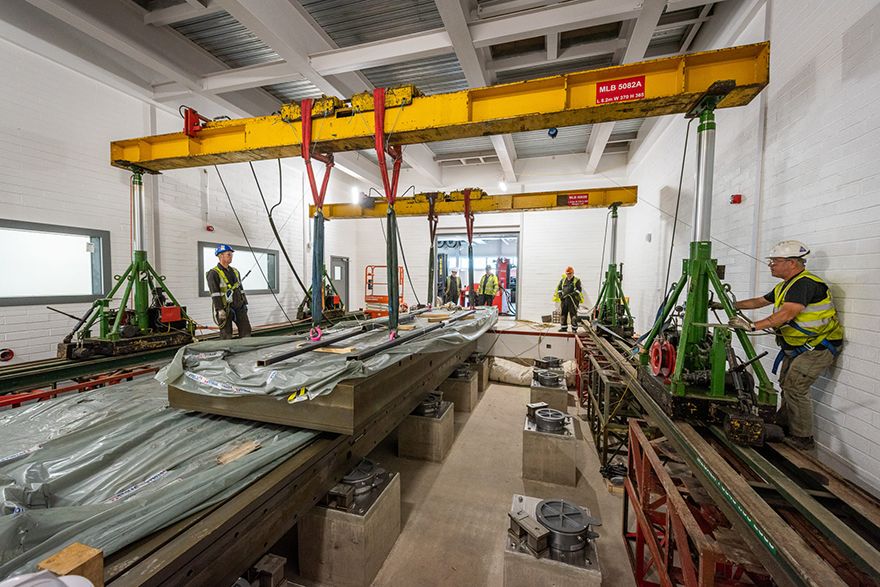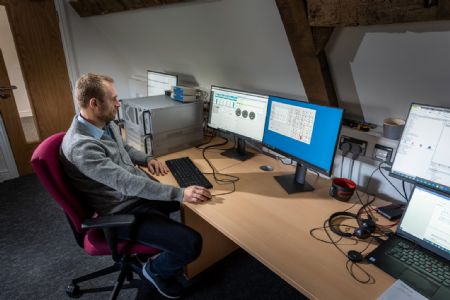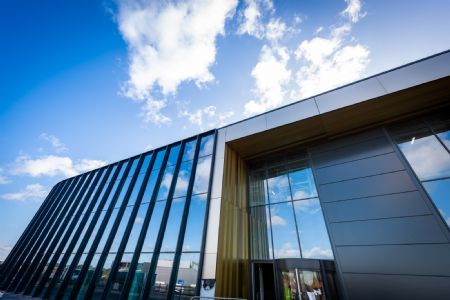 AVL team installing the bedplates at the new IAAPS R&I facility
AVL team installing the bedplates at the new IAAPS R&I facilityThe arrival of bedplates at the new
IAAPS £70 million research facility at the Bristol and Bath Science Park has marked the start of the next significant phase in development of the ‘ground-breaking’ new facility.
Austria-based
AVL, the world’s largest independent company for the development, simulation and testing of powertrain systems, which has a facility in Kidderminster, has started installing the specialist equipment that will create one of the UK’s top three independent automotive propulsion research centres.
The new IAAPS facility will build on existing automotive propulsion expertise at the University of Bath to become a global centre of excellence, delivering transformational research and innovation and supporting the automotive industries in meeting future air quality standards.
The first parts of the IAAPS 750kW powertrain cell were delivered to site in mid-September by the AVL team and the bedplates were then moved into their final position inside the research facility. The specialist AVL team will now work with IAAPS colleagues over the coming months to install the latest powertrain research equipment.
In total, the new facility will house 17 cells to enable deep insights into the complex nature of transitioning to future ultra-low and zero-emissions vehicles. IAAPS will enable research to be conducted into more and full electrification propulsion, hybrid configurations, energy storage and battery management as well as next-generation fuels and high-efficiency combustion engines.
Digital engineering will play a critical role in the research taking place in the facility, which has been designed to enable the integration of both physical and virtual test assets. The equipment will allow current research areas to be strengthened and new areas to be opened with a specific focus on whole vehicle assessments, particularly under real-world driving conditions.
Sustainable and affordable solutionsIAAPS will continue to align with the industry to find sustainable and affordable solutions to future developments in low- and zero-emission vehicles.

The opening of the facility, scheduled for summer 2021, will build on over 40 years’ automotive propulsion research at the University of Bath. The approach of the IAAPS team has consistently been to align with industry partners to solve the challenges of this constantly evolving and highly regulated landscape, applying academic rigour and laboratory-based precision to real-world driving scenarios.
IAAPS research aims to bridge the gap between the precision and repeatability of lab-based testing and the real-world, on-road environment, delivering insights that provide long-term, sustainable solutions to the future direction of the automotive industry.
In addition to the fit-out of the new research facility, expert teams at IAAPS and AVL will also collaborate on research projects which aim to advance knowledge in integrated simulation environments.
As the automotive industry looks to shift automotive testing and design into more virtual and simulated environments, experts at IAAPS and AVL will collaborate to explore new experimental verification techniques and develop more advanced hardware-in-the loop and driver-in-the-loop simulations.
Collaborative research activities will include preliminary driver behaviour investigations, initially using a virtual vehicle and powertrain and will build the capability and understanding needed to integrate simulation to the IAAPS physical assets.
It is also envisaged that research into test facility repeatability and accuracy within a single facility, across local complete test fields and physically distributed test fields, will be another key outcome.
Furthermore, and in order to address the skills shortage in the digital engineering arena, AVL are sponsoring six PhDs based around digital engineering themes within the AAPS Centre for Doctoral Training 2019 cohort.
These will involve digital tool sets and model development with subsequent integration into the AVL Integrated Open Development Platform (IODP). The expanded digital capability will support this current activity and it is anticipated that future cohorts of PhD students will make use of it in AVL-sponsored research.
The CDT’s transdisciplinary approach provides students with the opportunity to explore future technological, economic, societal and behavioural developments in the essential shift to more sustainable mobility.
Professor Chris Brace, IAAPS academic director, said: “The automotive industry needs new digital techniques to speed up the transition to sustainable propulsion systems. At IAAPS, we see increased collaboration between companies of all sizes as critical for the new, resource-constrained future. Digital tools are a critical enabler for this strategy as they can support seamless system-level collaboration.
“As we expand our facilities and expertise within IAAPS, we are working with global specialists such as AVL to accelerate the development of digital engineering, partnering with companies of all sizes to facilitate more efficient innovation.”
Rob Oliver, IAAPS engineering director, said: “I am delighted that we have reached this critical milestone at the new facility with the installation of the high-spec equipment which will make IAAPS stand out as a centre of excellence for research across all propulsion system types.
“AVL’s reputation as a leader in the development, simulation and testing of powertrain systems aligns perfectly with Bath’s expertise in delivering automotive propulsion research with impact.”

Wolfgang Puntigam, AVL global business unit manager, said: “The University of Bath and AVL’s collaboration on the new IAAPS building will create a new era of R&D facility which provides insights today to the development processes of the future.
“In the new IAAPS facility, completely new methodologies are applied which are allowing a fully virtualised, seamless and connected vehicle development process which will lead to overcoming current challenges in the sector. IAAPS is the perfect proving ground to enable higher agility and maximum speed to multi-disciplinary teams for different automotive applications from simulation to real testing.”
Danny Burchill, AVL UK operations director, said: “Following a productive period of engineering between the University of Bath and AVL teams to bring the vision of integrating AVL products into this “state of the art” IAAPS research facility, to reach this milestone is a testament to those associated with this project.
“We continue to build on the relationship and partnership between IAAPS and AVL as we move forward into the next phase of the programme with the installation of the innovative AVL equipment supporting the future development of propulsions systems in both the virtual and real world.”
The new IAAPS facility is scheduled to open next summer.